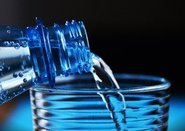Dispelling 5 Common Myths About Water

The human body needs water to function and survive. However, the consumption of that clear, life-giving liquid comes with some common misconceptions that are worth dispelling. Here are five beliefs that have a bit more to them than meets the eye.
1. Everyone should drink eight glasses of water a day
While this is true for women, men should be getting twelve glasses of liquid every day. How the “Eight 8-ounce glasses a day” rule started is anyone’s guess, but it has since been split between the genders as well as increased depending on an individual's level of daily physical activity. How much water the body needs to operate can go higher if that person is very active, in order to replenish lost fluids.
2. Being thirsty means dehydration
This isn’t necessarily the case. While it certainly indicates the need to get something to drink to quench that thirst, it doesn’t mean things have gotten that far. True dehydration starts when what is known as the “concentration of substances in the blood” goes up to 5%, at the very least. The symptoms of thirst start when the substances are at less than 2%, so feeling thirsty and being dehydrated aren’t exactly the same thing.
3. Serious athletic competitors benefit more from sports drinks than water
Ultimately, good old water is all the body needs to function at any activity level, whether it’s everyday activity or a professional sport. A 1-2% drop in hydration can affect sports performance, so it’s important to stay hydrated while engaged in high levels of activity. Water is actually the best way to maintain those critical fluids in the body during physical exertion. Drinking water before, during, and after physical activity will keep body temperature regulated and protect and cushion the muscles. While opinions about which exact amounts are best vary by expert and other factors like physical size and gender, the general rules are as follows:
•Before Physical Exertion: Drink 17-20oz. 2 hours before exercising
•During Physical Exertion: Drink 7-10oz. for every 10-20 minutes of exercise
•After Physical Exertion: Drink 16-24oz. for every pound lost from sweating
4. There’s no such thing as drinking too much water
As with anything, there can be too much of a good thing, even with water. There’s a desalination point that the body can reach if it gets too much fresh water and that can adversely affect the kidneys. Actually, it’s a good idea to be careful of just how much water one drinks while eating, as too much can cause the acid in the stomach to dilute which leads to indigestion and other issues. This brings us to myth number five.
5. It’s wrong to drink during meals
This is a blanket statement that is only partially true. While it’s important to not drink too much while eating, as shown in myth number four, it’s all right to have a little water. Actually, having a glass of water with a meal is a good thing. That one glass can help keep the amount of food someone is ingesting in check, because it will make them feel fuller faster.
Keep On Sipping
No matter what, water is a building block to maintaining a healthy lifestyle. Staying hydrated, especially with naturally sourced H2O like spring water, keeps blood flowing smoothly and the body and mind alert and operating properly. (delete: Water’s benefits far outweigh any of the concerns that surround it.)


















